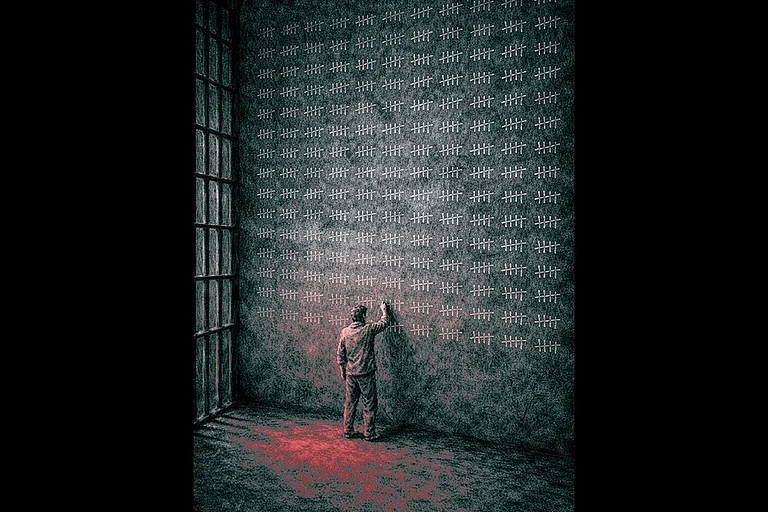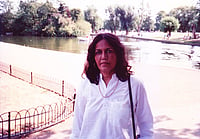I do not know what sort of man Saghar Siddiqui – who died in Lahore 50 years ago on July 19 – was. Was he even a qalandar or not? Which stage of enlightenment and awareness was his goal. When I read his poetry I could merely guess that he is slain, physically a victim of ours. With what bravery he got murdered and then bearing his graveless corpse on his shoulders, kept wandering on the populated roads of the city; kept thronging the squares. And kept fulfilling literature according to the sufi traditions of Punjab. The poet who was the follower of the ascetic path of Shah Hussain, Bulleh Shah, Waris Shah and Mian Muhammad Baksh, Saghar Siddiqui embraced death in those very circumstances that is the fate of such great poets. The difference between these poets and Saghar Siddiqui is one of language only otherwise he took that same tradition that was the custom of these great Sufi poets of Punjab to live in the streets, sewers and footpaths of Lahore.
He only knew that one should not hesitate to go forth, whether one finds hospitality along the way or not, it didn’t matter, that is why after his death covering his corpse in a black chador, he would light the flame of literature in the dark paths. Wearing black clothes is the next step after concealing the private parts; Saghar passed this stage in a manner from which it seems that he maintained the dignity of the wounds given to him by time. I am mentioning darkness since there is a mention of darkness everywhere in the bright verses of the poet. The mention of the blackness and tangling of tresses is common. For example,
Voh gesuu-e-jaanaan hon Saghar yagardish-e-dauraan ke saaye
Aevaaye muqaddar donon se uljhan ki tavaqqo rakhte hain
(Be they the beloved’s tresses Saghar or the shadows of the times’ motion
Oh what bad luck, from both we expect complication)
It is said about Saghar that he was a comb-maker by profession. Perhaps all his life due to the intense feeling of comb-making he attempted to untangle the tangled locks of society and according to Ghalib himself,
Hasrat-e-arz-e-tamannayaan se samjha chahiye
Do jahan hashr-e-zubaan-e-khushk hain juunshaana hum
(The longing for the expression of desire is to be understood from here
In both worlds we are the louse on the comb whose end is the dry tongue)
Had Saghar Siddiqui merely remained a comb-maker poet even then he would not have been any less; he became Saghar so to be smitten with distress stood vindicated. The tasters or drinkers of his verses think together with their senses rather than being intoxicated that such savage consciousness of its time is contained in this goblet. The power of feeling with which he sees time, the angles of sense with which he sheds light on the movement of the times; this unique expression of sense and understanding makes him a herald of his time.
Some friends of Saghar called him a lunatic, I do not accept this. In my opinion the standard of shrewdness with which he witnessed the Man of his time, people began to call him insane because of that very standard. We humans who are spread close to him are worried with greed at every moment; nobody cares for another. Saghar knew about such worried people. He withdrew from them.
His poetry is a requiem for the attitude of the new nation of Pakistan after the partition of India, for which a philosopher poet composed anthems of greatness for years; constructed a new nation from the pages of Islamic history; dreamt. Iqbal was not destined to see the interpretation of this dream, rather it was Saghar’s fate to wander the streets of this country made from pages, worried. Saghar kept wandering about, but he never said anywhere that
Kaghazi hai pairahan, “us” paikar-e-tasveer ka
(“That” picture wears paper robes)
He lived and lived with hope.
The borderline which 14 August 1947 had drawn, Saghar is purely a poet of that side of this line, he crossed the border with poetic expectations. He strolled the land of the new country brimming with joy, met people, saw, then time had given a cup of poison in every hand. Socrates died one by one, Saghar too died, but his voice kept reaching the ears like an echo sometimes through radio and sometimes due to newspapers. He said:
Dastoor yahan bhi goonge hain farman yahan bhi andhe hain
Ae dost khuda ka naam na le emaan yahan bhi andhe hain
Be-rang shafaq si dhalti hai be-noor savere hote hain
Shaayir ka tasavvur bhooka hai sultan yahan bhi andhe hain
(Constitutions here too are dumb decrees here too are blind
O friend do not say God’s name faiths here too are blind
A colourless twilight is declining dark days are dawning
The poet’s imagination is hungry the rulers here too are blind)
Poor Saghar could not convince himself that Pakistan is not an ideological country but a battlefield of politicians. Politics carries the status of a science in modern terminology. People of ancient times called it a fox in a henhouse. Here this same fox in the henhouse was in power which politicians used to give the name of democracy. Their democracy is a goodish name for the reign of the fox. A fox is always up and about in a jungle; where they roam in groups what condition would that place be in? For the last 50 years what to talk of one Saghar who knows how many people are in bad luck. Saghar Siddiqui was high-minded and innovative in that he found a way to protest and boycott. Lighting a fire and sitting over it like a yogi, he cried in the middle of the smoke and kept performing the duty of forewarning the others of the outdated traditions and moth-eaten consciences of the outdated system. Just pick any of his ghazals, one will definitely find one or two such couplets which indicate negative forces.
Be-vaja tu nahin hain chaman ki tabahiyan
Kuchh baghban hain barq-o-sharar se mile hue
(The destructions of the garden are not without reason
A few gardeners conspired with this fiery coalition)
Saghar does not blame the heaven; he complains about time. How many pains does time inflict in the form of Man and what all colours it changes. Saghar says,
Kuchh haal ke andhe saathi the kuchh maazi ke ayyar sajjan
Ahbab ki chaahat kya kahiye kuch yaad rahi kuchh bhool gaye
(A few blind friends of the present a few sly lovers of the past
I cannot mention the love of friends some I remembered some I forgot)
Zaroorat-e-raah ke mutaabiq musafiron ne bhi seekh li hai
Voh rahzani mudatton rahi hai jo rahbaron ka shi’aar ban kar
(The travellers too have learnt according to the exigencies of the way
That robbery with which for long the leaders held their sway)
At another place this man of consciousness makes the innocent people of his time aware with such an ascetic manner:
Abhi to us subah ke maathe ka rang kaala hai
Abhi fareb na khao bada andhera hai
(Now the forehead of the morning has a dark complexion
There is great darkness, now do not remain in deception)
It is said that Saghar’s friends are bothered by the fact that critics did not consider his verses worthy of attention. Nobody ever wrote anything on him friends! The herald does not need an expression of happiness, for that if people keep their ears open, it is better for them. If they don’t, who cares? He will pass by speaking the truth.
Those who saw this dark-complexioned, unfortunate man dressed in black agreed that Saghar’s social position was nothing. Others saw in him a poet of great darkness, a man with a dark body and a luminous heart.
I saw Saghar – who was a person – with the help of Yunus Adeeb, his closest friend and Julien Columeau, the Frenchman who interpreted and fictionalized Saghar in his eponymous Urdu novellete. I read Saghar – who was a poet – with the help of his verses. When I understood him by bringing both together, then Saghar appeared to be a sign, proved to be the representative of a class which had been grinded for many years. Who knows how many more Saghars have been entrusted with the duty of representation of this class, who have
Zindagi jabr-e-musalsal ki tarah kaati hai
Jaane kis jurm ki paayi hai saza yaad nahi
((I)have lived life like a constant oppression
Who knows for which crime I am punished I have forgotten)
Chhupaye dil mein ghamon ka jahan baithe hain
Tumhari bazm mein hum be-zubaan baithe hain
(I am seated hiding a world of sorrows in my heart
In your company I am seated speechless)
Ye aur baat ke manzilpe hum pohanchna sake
Magar ye kam hai ke raahon ko chhaan baithe hain
(It is a separate matter that we could not reach the destination
But is it any less that of the roads we have carried a minute examination)
On the basis of his attitude, a few people maybe calling him a fugitive, runaway and who knows what all; charging him with romanticism, conservatism and despair. And will also say that he was not committed to an ideology. He neither had a mission nor a party. His voice was neither prophetic nor sage-like, neither preaching nor guiding. He was a poet like there are many other poets but before giving a verdict this much should be remembered that his voice was friendly and beggarly.
Do qadam raaegaan hue hain tou kya
Do qadam aur justaju kar lo
(What if we lost a few steps
Search for a few steps more)
Zamana keh raha hai main nayi karvat badalta hoon
Anokhi manzilen hain kuchh nirale rahnuma chun len
(The world is saying I am changing my condition
Choose a few rare leaders for many a unique destination)
Koi naya rang bakhsh is ko koi nayi rooh phoonk is mein
Gurez karne lagenge varna hadees-e-yazdaan se log saqi
(Put life into it bestow some new colour
Otherwise, people will begin to evade the Divine tradition O cupbearer)
I do not know what circumstances Saghar faced in life. Who were the people responsible for his social boycott. Anyhow I do know that as a Pakistani citizen I too am unwittingly a participant among his murderers and today salute his known conviction and sincere greatness.
.jpg?w=334&auto=format%2Ccompress&fit=max&format=webp&dpr=1.0)
A Poem
An Offering of Fresh Flowers on Saghar's Grave
(Prompted by author's maiden visit to Saghar's tomb in Miani Sahib 4 weeks ago, he attempted to write a poem smitten by the experience)
That same city where (he) died in great agony
That same city in which O Saghar
You were robbed of your poetry
For a few coins, for a bottle
The world always treated you with trickery
Time kept hurting you
And you kept concealing the wounds in your heart
You kept being faithful to life in this manner
How you lived this demeanour
This I do think
How did you even live?
It was a horrible dream
What kind of life was your life?
Today you died
You who in the world of selfish people
Were lost in the desire to meet selfless people
Today standing near the head of your grave
I, in this very city
Holding a garland of flowers in my hands
Having a flowing sea of tears
In my eyes
I think
Will my lamentation
Bring any peace to your soul
Broken into pieces
Will this thing be for you
A source of relaxation?
That this man from the selfish world
Carrying a wish to wash with tears
The writing full of regret on his face
Is standing today near the head of your grave
Note: All translations from the Urdu are by the writer.
(The author is an award-winning researcher and translator based in Lahore and president of the Progressive Writers’ Association. He may be reached at razanaeem@hotmail.com. He tweets at @raza_naeem1979)





















.jpg?w=200&auto=format%2Ccompress&fit=max)




